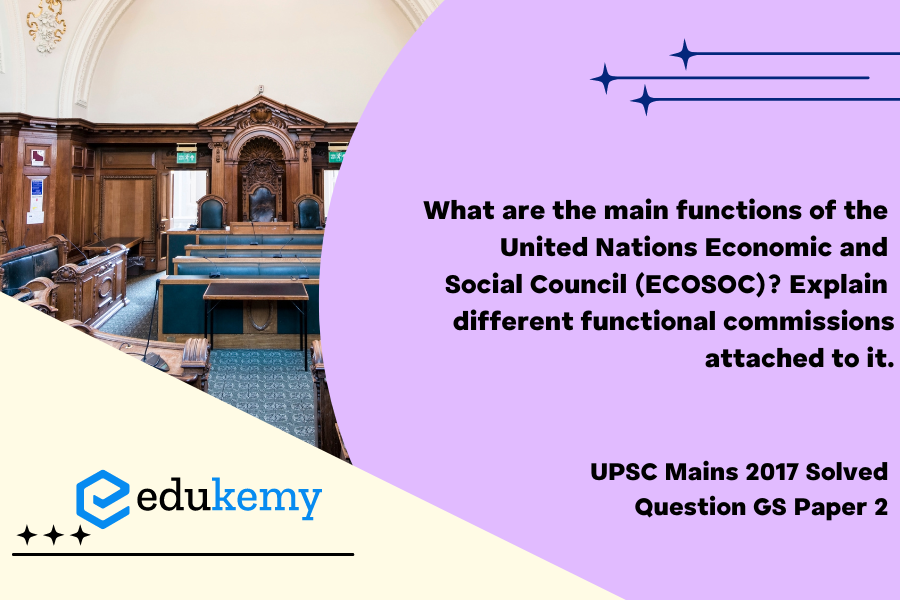The United Nations Economic and Social Council (ECOSOC) serves as a pivotal organ within the UN system, dedicated to advancing international cooperation and fostering socio-economic development worldwide. Its primary functions encompass the promotion of sustainable development, coordination of humanitarian assistance, and the facilitation of collaboration among member states to address global challenges. ECOSOC plays a crucial role in formulating policies, conducting research, and offering recommendations on a wide array of economic, social, and environmental issues. Comprising several functional commissions, each specializing in distinct thematic areas, ECOSOC ensures a comprehensive approach to its mandate. These commissions, such as the Commission on Social Development, the Commission on the Status of Women, and the Commission on Population and Development, focus on specific concerns, allowing for targeted efforts and expertise to address the diverse facets of global socio-economic development. Through these commissions, ECOSOC contributes significantly to the realization of the UN’s overarching goals and the advancement of collective well-being.
Tag: International Relation.
Contents
Decoding the Question:
- In Introduction, briefly write about the United Nations Economic and Social Council (ECOSOC).
- In Body, discuss various functions of the council.
- In Conclusion, mention the overall significance of council.
Answer:
ECOSOC, established in 1945 by the UN Charter, is a key UN organ promoting sustainable development in economic, social, and environmental dimensions. It serves as the primary forum for fostering debate, generating innovative solutions, and coordinating efforts to achieve globally agreed-upon goals.
Functional Commissions of ECOSOC:
- Statistical Commission: It oversees the work of the United Nations Statistics Division (UNSD), the highest body of the global statistical system.
- Commission on Population and Development: It monitors, reviews, and assesses the implementation of the Programme of Action of the International Conference on Population and Development at the national, regional, and global levels, identifying reasons for success and failure, and advising the Council thereon.
- Commission for Social Development: It advises ECOSOC on social policies of a general character and, in particular, on all matters in the social field not covered by the specialized inter-governmental agencies.
- Commission on the Status of Women: It is the principal global intergovernmental body exclusively dedicated to the promotion of gender equality and the empowerment of women.
- Commission on Narcotic Drugs: It assists the ECOSOC in supervising the application of international drug control treaties.
- Commission on Crime Prevention and Criminal Justice: It acts as the principal policy-making body of the United Nations in the field of crime prevention and criminal justice.
- Commission on Science and Technology for Development: It provides the General Assembly and ECOSOC with high-level advice on relevant science and technology issues.
- United Nations Forum on Forests: It is an intergovernmental body to strengthen political commitment and action concerning sustainable forest management.

Functions of ECOSOC:
- It serves as a central forum for discussions on international economic and social issues and hold special meetings for emergency issues. For example, the global food crisis in 2008, Ebola outbreak, etc.
- It promotes higher standards of living, full employment, and economic and social progress.
- It finds solutions of international economic, social, health, and related problems, and international cultural and educational cooperation.
- It encourages universal respect for and observance of human rights and fundamental freedoms.
- It also assists the organization of major international conferences in the field of economic and social and related fields.
- It initiates studies and reports concerning international economic and social matters.
- It prepares draft conventions for submission to the General Assembly.
- It also coordinates the work of the specialized agencies and programs and their functional commissions and five regional commissions.
- It plans for consultations with non-governmental organizations.
- It also manages the smooth transition from MDGs to SDGs.
ECOSOC It is a principal body for coordination, policy review, policy dialogue, and recommendations on economic, social, and environmental issues, as well as for implementation of the internationally agreed development goals. It can be strengthened by improving links between ECOSOC and the other main intergovernmental organs; enhancing cooperation between the United Nations with other multilateral organizations; and creating a more focused profile of the Council’s functions and responsibilities.
In case you still have your doubts, contact us on 9811333901.
For UPSC Prelims Resources, Click here
For Daily Updates and Study Material:
Join our Telegram Channel – Edukemy for IAS
- 1. Learn through Videos – here
- 2. Be Exam Ready by Practicing Daily MCQs – here
- 3. Daily Newsletter – Get all your Current Affairs Covered – here
- 4. Mains Answer Writing Practice – here


